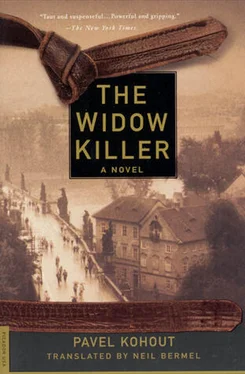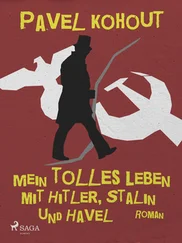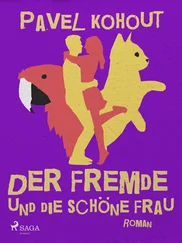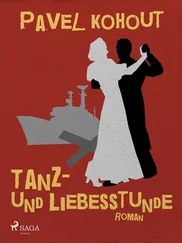“Aha….”
He could not think of anything better, but what was there to say anyway? His Germany was locked in a life-or-death battle, and what was the Czech’s sympathy worth, anyway, if he didn’t even bother to hide his allegiance to the enemy?
“His” Germany! Yes, unfortunately so.
In his mind’s eye he saw Hilde in the Franconian vineyards and once again heard her question: Wasn’t it the Führer who had lost touch with his people rather than the other way around? At the time — not all that long ago — Buback had babbled confidently about the iron will of all Germans. Today remorse stung him as he realized that hers could not have been the only voice in the wilderness. After all, it anticipated his own doubts as well. And Grete? Was it just the natural cynicism of a generation come of age in wartime that made her avoid any mention of it? Was her obsession with passion and love a woman’s only way of resisting this type of Germanness?
Buback had broken off the conversation after leading it down a figurative blind alley. Now the car approached an actual one. A large sign directed drivers to turn off the main road for a detour. They had used it this morning on the way from Prague, arcing around the forbidden zone where, as the signs cautioned, guards would shoot without warning.
“Tell him to go straight,” Buback ordered on a sudden impulse.
Morava immediately translated it, but Litera stopped the car.
“Is he crazy?” the driver asked in Czech.
The assistant detective translated it as a polite question: Could they really do so?
“Tell him to go,” Buback repeated. “I’ll deal with it; it’ll save us half an hour.”
He assumed both Czechs had some idea what hid behind the walls of the Theresienstadt fortress and former army base. At the stone gates, a barrier and men in SS uniforms stopped them. They studied Buback’s document much more closely than the military police had done that March in Moravia, and demanded the police IDs of both Czechs as well, but finally let them pass without a word.
The road led into streets that at first glance looked almost normal. The only surprising details were the barrackslike appearance of the buildings and the throngs of people that immediately surrounded the car. Buback had been through here quickly once before, investigating a case last winter: the deputy commander of the so-called Lesser Fortress had been robbing other officers. Thanks to Buback, he disappeared into a chain gang out east. That time too Buback had only driven through the fortified city, but the images of the strange anthill were unpleasantly fixed in his memory.
During their visit no one had attempted to explain to either him or his deputy Rattinger whether this was a permanent population or not, whether this was a practice run or a test of how Jews would get along in the victorious Reich, or whether this was just a way station on a journey somewhere else. No information was forthcoming, not even a hint, and asking questions was a violation of military secrecy.
From comments heard here and there in the Gestapo building, he had nonetheless formed his own picture. The most logical one seemed to be— and his first cursory visit to Theresienstadt confirmed him in this belief— that the Jews had been resettled in this way here and there, primarily in the East, where they had always been more common. It therefore shocked him when Grete laughed rudely at his recent mention of it.
“Buback! Are you really that naive, or that cunning?”
“What are you trying to tell me?” he asked, stunned.
“Nothing at all. If you’re that cunning, I don’t need to tell you anything, and in the other case I don’t want to deprive Germany of its last lotus flower. I’ll admit, I’m an ostrich with my head in the sand.”
Nothing could persuade her to explain herself, and for the first time he had the impression that she did not completely trust him.
For God’s sake, it wasn’t as if Himmler’s executioners were really liquidating them, as he’d heard in those anonymous rumors that refused to die! Of all the things his lover had offered him since that first night, her joyous levity fascinated him most. His early bad experiences taught him to avoid disrupting Grete’s now continuous sunny weather, so he swallowed her mockery this time as well. The day before yesterday he had heard a reliable report in Bredovská Street that a Red Cross mission led by Count Bernadotte of Sweden was operating in this very ghetto. It confirmed his cautious optimism: Otherwise they’d never let in a prominent neutral power, which could report any crimes they found to the world. However, he decided not to mention it to Grete….
As opposed to his last visit, the winter coats, blankets, and rags of various origins that protected their wearers from the cold had vanished from the streets, as had the infamous yellow stars. Neither did they see a single German uniform. The Jews — for Jews they clearly were — plied their trades, bought and sold, but also kept the peace. Even an exacting Swedish eye could hardly find fault with this picture, so why did he find it even more disturbing now than last time?
The answer was obvious: Suddenly he was seeing it through the eyes of the two astounded Czechs. The crowd fell silent, doffed their hats, and pressed to the side of the road at the mere sight of three civilians in a car — only the threat of imminent death could strike this sort of dread into people’s hearts. Yes, Hilde had sensed the truth and Grete probably knew it directly from Meckerle. But simpleminded little Erwin had stayed faithful till the bitter end, the slave of a regime embodying the very opposite of the values he thought he had spent his life serving.
He was so deeply depressed that his companions sensed something was wrong. Why had he treated them to this spectacle, which he was supposed to hide from them? The human mobs suddenly ended at the exit gates. The guards let them pass without notice and the car rolled past the ramparts of the Lesser Fortress and out into the open countryside. Suddenly he knew why he had done it. He turned to Morava.
“I want you to know that I don’t agree with that.”
And when his neighbor did not respond, he added, “Take it as a confidence, in return for yours.”
They did not speak the rest of the way back to Prague. He had no idea what the two Czechs were thinking, but felt relieved anyway. At last he had done and said what he should have a long time ago.
He caught himself thinking intently about Grete again. What did she mean to him? For some reason he couldn’t see in her the one thing he’d wanted so desperately from the Czech girl: a future. But what was so strange about that? It was probably why Grete did not want to hear his story. Only the present could link a man and woman whose destinies and personalities were so different; a deeper feeling and a more serious relationship would cost them both too much. Wasn’t it significant that neither had thought to ask the other what to do if the unthinkable happened? A volcano could erupt under them any day now, and they had not even discussed where and how they’d find each other afterward.
“Where to?” the driver asked in Czech, and Morava repeated it in German.
The car was approaching downtown Prague. Buback glanced at his watch. Past two. Grete was finished with widowhood for today, and was probably catching a nap before the afternoon trip out to the troops. He’d see her later, he was sure of that: She no longer missed a day.
“I’ll go with you,” he decided. “Let’s contact the diocese right away, so we don’t waste time tomorrow.”
The surprise at Bartolom  jská Street hit Buback harder than Morava. A chain of SS forces had closed off the road. Their car was immediately surrounded by heavily armed giants and they were ordered to leave the vehicle. He pulled out his papers again.
jská Street hit Buback harder than Morava. A chain of SS forces had closed off the road. Their car was immediately surrounded by heavily armed giants and they were ordered to leave the vehicle. He pulled out his papers again.
Читать дальше

 jská Street hit Buback harder than Morava. A chain of SS forces had closed off the road. Their car was immediately surrounded by heavily armed giants and they were ordered to leave the vehicle. He pulled out his papers again.
jská Street hit Buback harder than Morava. A chain of SS forces had closed off the road. Their car was immediately surrounded by heavily armed giants and they were ordered to leave the vehicle. He pulled out his papers again.










